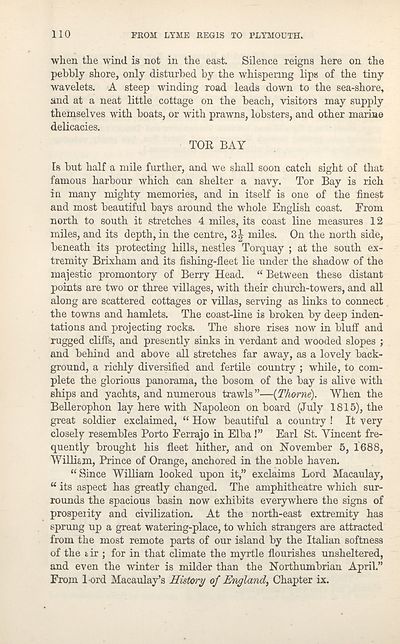Download files
Complete book:
Individual page:
Thumbnail gallery: Grid view | List view

110
FROM LYME REGIS
PLYMOUTH.
when the wind is not in the east. Silence reigns here on the
pebbly shore, only disturbed by the whispering lips of the tiny
wavelets. A steep winding road leads down to the sea-shore,
and at a neat little cottage on the beach, visitors may supply
themselves with boats, or with prawns, lobsters, and other marine
delicacies.
TOR BAY
Is but half a mile further, and we shall soon catch sight of that
famous harbour which can shelter a navy. Tor Bay is rich
in many mighty memories, and in itself is one of the finest
and most beautiful bays around the whole English coast. From
north to south it stretches 4 miles, its coast line measures 12
miles, and its depth, in the centre, 3£ miles. On the north side,
beneath its protecting hills, nestles Torquay ; at the south ex¬
tremity Brixham and its fishing-fleet lie under the shadow of the
majestic promontory of Berry Head. “ Between these distant
points are two or three villages, with their church-towers, and all
along are scattered cottages or villas, serving as links to connect
the towns and hamlets. The coast-line is broken by deep inden¬
tations and projecting rocks. The shore rises now in bluff and
rugged cliffs, and presently sinks in verdant and wooded slopes ;
and behind and above all stretches far away, as a lovely back¬
ground, a richly diversified and fertile country ; while, to com¬
plete the glorious panorama, the bosom of the bay is alive with
ships and yachts, and numerous trawls ”—{Thorne). When the
Bellerophon lay here with Napoleon on board (July 1815), the
great soldier exclaimed, “ How beautiful a country ! It very
closely resembles Porto Ferrajo in Elba!” Earl St. Vincent fre¬
quently brought his fleet hither, and on November 5, 1688,
William, Prince of Orange, anchored in the noble haven.
“Since William looked upon it,” exclaims Lord Macaulay,
“ its aspect has greatly changed. The amphitheatre which sur¬
rounds the spacious basin now exhibits everywhere the signs of
prospeiity and civilization. At the north-east extremity has
sprung up a great watering-place, to which strangers are attracted
from the most remote parts of our island by the Italian softness
of the tir ; for in that climate the myrtle flourishes unsheltered,
and even the winter is milder than the Northumbrian April.”
From l ord Macaulay’s History of England, Chapter ix.
FROM LYME REGIS
PLYMOUTH.
when the wind is not in the east. Silence reigns here on the
pebbly shore, only disturbed by the whispering lips of the tiny
wavelets. A steep winding road leads down to the sea-shore,
and at a neat little cottage on the beach, visitors may supply
themselves with boats, or with prawns, lobsters, and other marine
delicacies.
TOR BAY
Is but half a mile further, and we shall soon catch sight of that
famous harbour which can shelter a navy. Tor Bay is rich
in many mighty memories, and in itself is one of the finest
and most beautiful bays around the whole English coast. From
north to south it stretches 4 miles, its coast line measures 12
miles, and its depth, in the centre, 3£ miles. On the north side,
beneath its protecting hills, nestles Torquay ; at the south ex¬
tremity Brixham and its fishing-fleet lie under the shadow of the
majestic promontory of Berry Head. “ Between these distant
points are two or three villages, with their church-towers, and all
along are scattered cottages or villas, serving as links to connect
the towns and hamlets. The coast-line is broken by deep inden¬
tations and projecting rocks. The shore rises now in bluff and
rugged cliffs, and presently sinks in verdant and wooded slopes ;
and behind and above all stretches far away, as a lovely back¬
ground, a richly diversified and fertile country ; while, to com¬
plete the glorious panorama, the bosom of the bay is alive with
ships and yachts, and numerous trawls ”—{Thorne). When the
Bellerophon lay here with Napoleon on board (July 1815), the
great soldier exclaimed, “ How beautiful a country ! It very
closely resembles Porto Ferrajo in Elba!” Earl St. Vincent fre¬
quently brought his fleet hither, and on November 5, 1688,
William, Prince of Orange, anchored in the noble haven.
“Since William looked upon it,” exclaims Lord Macaulay,
“ its aspect has greatly changed. The amphitheatre which sur¬
rounds the spacious basin now exhibits everywhere the signs of
prospeiity and civilization. At the north-east extremity has
sprung up a great watering-place, to which strangers are attracted
from the most remote parts of our island by the Italian softness
of the tir ; for in that climate the myrtle flourishes unsheltered,
and even the winter is milder than the Northumbrian April.”
From l ord Macaulay’s History of England, Chapter ix.
Set display mode to:
![]() Universal Viewer |
Universal Viewer | ![]() Mirador |
Large image | Transcription
Mirador |
Large image | Transcription
| Antiquarian books of Scotland > Adventure and adventurers > Black's guide to the counties of Dorset, Devon, & Cornwall > (132) |
|---|
| Permanent URL | https://digital.nls.uk/142587962 |
|---|
| Description | Thousands of printed books from the Antiquarian Books of Scotland collection which dates from 1641 to the 1980s. The collection consists of 14,800 books which were published in Scotland or have a Scottish connection, e.g. through the author, printer or owner. Subjects covered include sport, education, diseases, adventure, occupations, Jacobites, politics and religion. Among the 29 languages represented are English, Gaelic, Italian, French, Russian and Swedish. |
|---|

